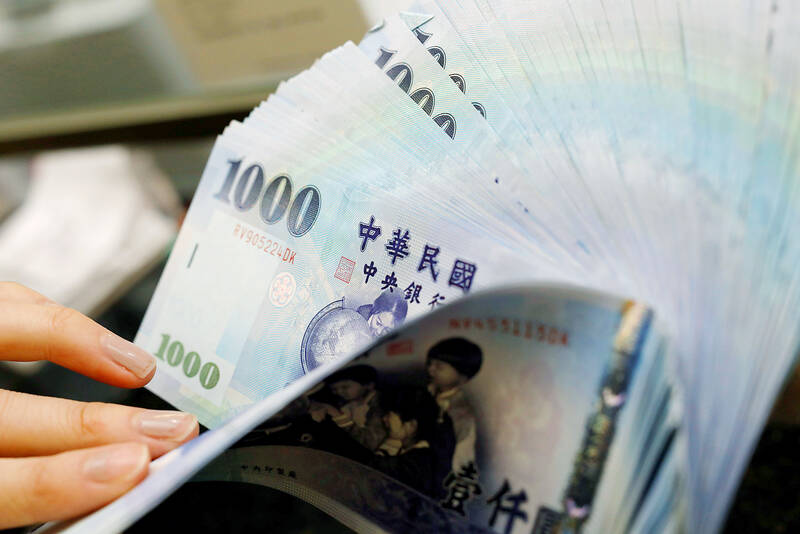From April 10 to Friday last week, Meta Platforms Inc and Google Taiwan removed a combined 1,363 scam investment advertisements from their platforms, the Financial Supervisory Commission said yesterday, as it warned of the continuing prevalence of fraudulent information.
That compares with the 39 scam ads they deleted a month earlier, the commission said.
During the period, the commission detected 1,615 ads that were highly likely to be scams to Meta, the owner of Facebook and Instagram, and Meta removed about 83 percent of them, or 1,338 ads, it said.

Photo: Tyrone Su, Reuters
The commission found 105 suspicious ads on Google during the same period, with Google deleting 25 ads, or 24 percent of the total, it said.
Even though Google has a lower cancelation ratio, the company is willing to cooperate with the commission in fighting fraud and conducts an internal examination before removing suspicious posts, the commission said.
The scam ads mostly feature fake endorsements by celebrities or executives of big financial companies as well as stock analyses, and invite platform visitors to join messaging groups, the commission said.
Cathay Financial Holding Co (國泰金控) chairman Tsai Hung-tu (蔡宏圖), Cathay Securities Investment Trust Co (國泰投信) chairman Jeff Chang (張錫), SinoPac Financial lead economist Jack Huang (黃蔭基) and CTBC Bank retail banking CEO Amy Yang (楊淑惠) have been featured in the fake ads, data showed.
Besides partnering with online platforms, the commission said it is to tighten the Securities Investment Trust and Consulting Act (證券投資信託及顧問法) to curb investment misinformation.
Advertisements must not entice people to invest or guarantee returns, use the name of celebrities and other people or organizations without their consent, while companies or individuals must use their real names when applying to post ads on online platforms, the commission said.
Online platforms would be held liable if advertisements are found to be fraudulent and lead to losses for consumers, it said.

When an apartment comes up for rent in Germany’s big cities, hundreds of prospective tenants often queue down the street to view it, but the acute shortage of affordable housing is getting scant attention ahead of today’s snap general election. “Housing is one of the main problems for people, but nobody talks about it, nobody takes it seriously,” said Andreas Ibel, president of Build Europe, an association representing housing developers. Migration and the sluggish economy top the list of voters’ concerns, but analysts say housing policy fails to break through as returns on investment take time to register, making the

‘SILVER LINING’: Although the news caused TSMC to fall on the local market, an analyst said that as tariffs are not set to go into effect until April, there is still time for negotiations US President Donald Trump on Tuesday said that he would likely impose tariffs on semiconductor, automobile and pharmaceutical imports of about 25 percent, with an announcement coming as soon as April 2 in a move that would represent a dramatic widening of the US leader’s trade war. “I probably will tell you that on April 2, but it’ll be in the neighborhood of 25 percent,” Trump told reporters at his Mar-a-Lago club when asked about his plan for auto tariffs. Asked about similar levies on pharmaceutical drugs and semiconductors, the president said that “it’ll be 25 percent and higher, and it’ll

NOT TO WORRY: Some people are concerned funds might continue moving out of the country, but the central bank said financial account outflows are not unusual in Taiwan Taiwan’s outbound investments hit a new high last year due to investments made by contract chipmaker Taiwan Semiconductor Manufacturing Co (TSMC, 台積電) and other major manufacturers to boost global expansion, the central bank said on Thursday. The net increase in outbound investments last year reached a record US$21.05 billion, while the net increase in outbound investments by Taiwanese residents reached a record US$31.98 billion, central bank data showed. Chen Fei-wen (陳斐紋), deputy director of the central bank’s Department of Economic Research, said the increase was largely due to TSMC’s efforts to expand production in the US and Japan. Investments by Vanguard International

WARNING SHOT: The US president has threatened to impose 25 percent tariffs on all imported vehicles, and similar or higher duties on pharmaceuticals and semiconductors US President Donald Trump on Wednesday suggested that a trade deal with China was “possible” — a key target in the US leader’s tariffs policy. The US in 2020 had already agreed to “a great trade deal with China” and a new deal was “possible,” Trump said. Trump said he expected Chinese President Xi Jinping (習近平) to visit the US, without giving a timeline for his trip. Trump also said that he was talking to China about TikTok, as the US seeks to broker a sale of the popular app owned by Chinese firm ByteDance Ltd (字節跳動). Trump last week said that he had